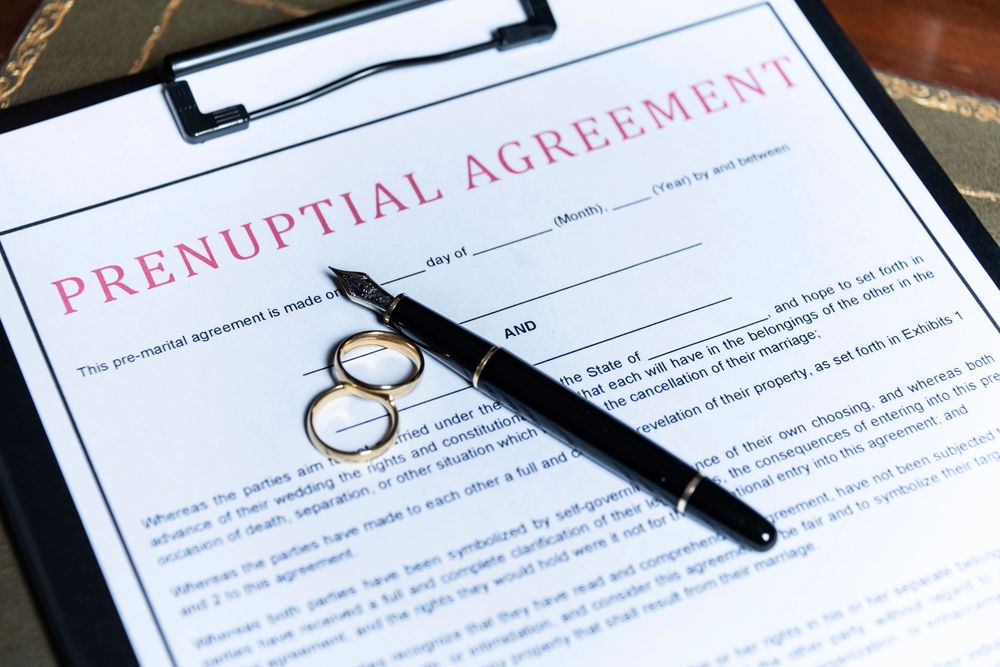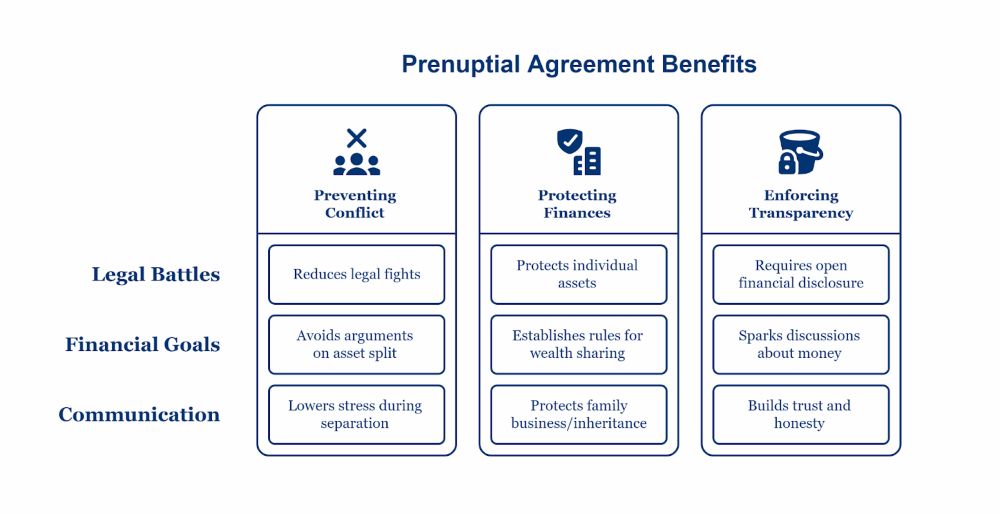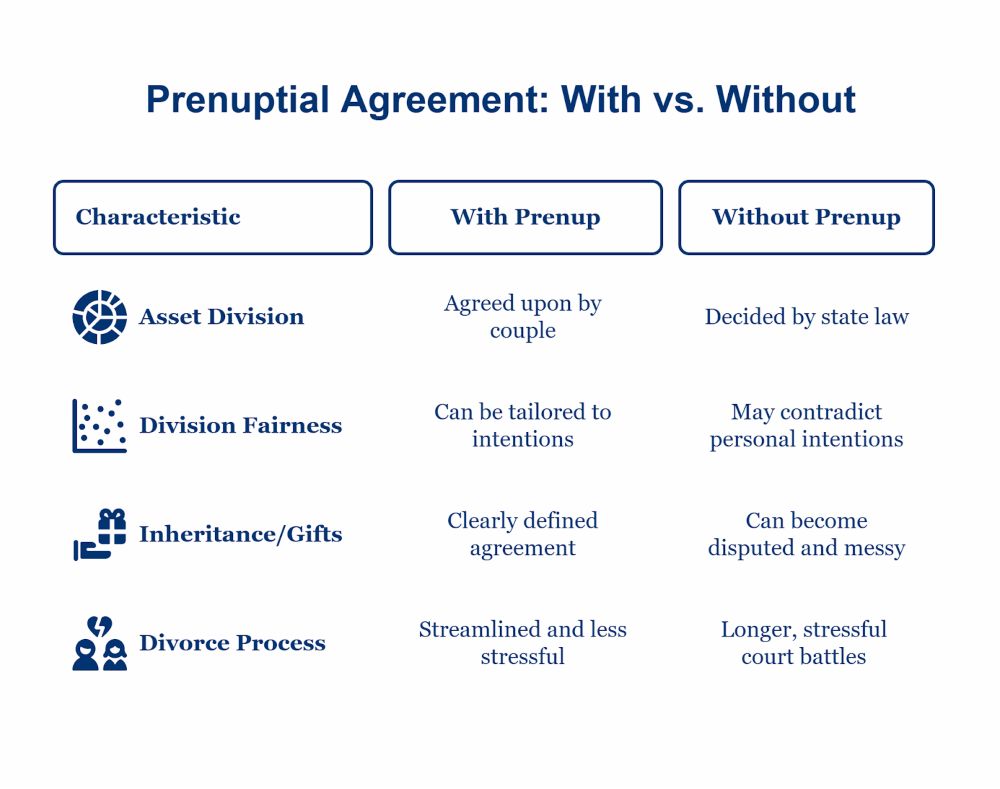

Originally published: May 2025
Couples tying the knot in 2025 face new financial realities and shifting family dynamics. They’re also asking tougher questions about how to protect their futures.
While some still see prenuptial agreements (prenups) as a red flag, more people realize their real value.
A prenuptial agreement gives couples a clear plan, helping them dodge stress, protect their assets, and make important decisions together—before saying “I do.”
Prenups aren’t just for the wealthy or those with complicated finances. As legal professionals in premarital agreements point out, they help couples clarify debts, protect business interests, and even prepare for surprises.
Starting the conversation early relieves pressure and helps avoid last-minute confusion.
Misunderstandings about prenups are still common, but today’s couples are realizing these agreements can build trust. By planning, couples make thoughtful choices that benefit them both.
Couples in 2025 are changing how they approach marriage. New data and shifting social views explain why more people choose prenuptial agreements before saying “I do.”
“62% of attorneys reported increased prenuptial agreements among Millennials.”
— American Academy of Matrimonial Lawyers (AAML),
Millennials and Gen Z are driving new trends in marriage. Many no longer see a prenup as a sign of mistrust—it’s just practical.
The conversation isn’t as awkward or taboo as it used to be. Public discussion now highlights how prenuptial agreements can build trust by setting clear expectations.
Some experts say both partners benefit when they work together on an agreement. For many, a prenup is about building a strong foundation, not planning for failure.
Online forums and articles show couples feel more comfortable bringing up the topic. Some even see prenups as a modern must-have, especially if they have student debt or separate careers.
Families want to take steps toward protecting their inheritances and personal assets, which is also fueling the trend.
Surveys in 2025 show a big spike in couples asking lawyers about prenuptial agreements. Forty percent of newlyweds this year said they considered a prenup—a significant jump from past years.
Attorneys say most requests come from couples in their late 20s and early 30s, and economic changes are a big part of this shift.
People are marrying later, often with more assets and debt, so financial planning before marriage matters more.
Millennials are likelier to own property, invest, or bring in unique business interests that need protection.
Legal professionals point out that a prenuptial agreement clarifies rights about property, debt, and even future income. Sometimes parents or relatives encourage couples to use prenups to protect family assets.
Planning your future together? Contact Cooper Trachtenberg Law Group to create a prenuptial agreement that protects love, legacy, and financial clarity..
If you’re ready to get started, call us now!
A prenuptial agreement is a legal contract that protects each partner’s interests and sets out clear guidelines for finances and responsibilities. It covers dividing assets, debts, and possible inheritance if the marriage ends.
A prenuptial agreement (prenup) outlines how property and money will be divided in the event of a divorce. Both partners can separate certain assets, such as money earned before marriage, savings, stocks, or business interests.
If one person owns a business, the agreement ensures that the company stays with its original owner.
This premarital agreement offers financial protection, which is useful for business owners who wish to separate their personal and business finances.
Financial debts are addressed, too. If one partner has student loans or credit card debt, the agreement holds them responsible for their debts.
This way, one spouse won’t get stuck with bills that aren’t theirs after a divorce or separation. In short, the prenup sets clear rules for handling assets and debts during and after the marriage.
Prenuptial agreements are crucial for protecting inheritance and family-owned property.
These agreements help people decide whether family heirlooms, inheritances, or shares in a family business will remain with the original family, regardless of the state of the marriage.
Couples can use the prenup to state that inherited assets or future inheritances will not be divided as marital property. This is important for spouses who expect to receive property or cash gifts from relatives.
A prenup can also help families feel confident that generational assets will remain in the family, even if the marriage fails. That kind of peace of mind matters to many people.
The agreement can set terms for spousal support (alimony), so both partners know what to expect if they separate. This might include a specific amount, a time limit, or even a full waiver of alimony.
A prenup can also clarify income expectations during the marriage. Couples might agree on how to manage finances, who pays for what, or how to split household bills.
If one partner plans to step back from work to raise kids, the agreement can explain how that later affects spousal support or property division. Clear rules can prevent headaches and make circumstances less stressful if life changes.
Prenuptial agreements still cause confusion and worry, but many beliefs about them are outdated. Understanding what prenups do helps couples feel more confident before getting married.
Some people think prenups are just for people with huge bank accounts or valuable family assets.
In reality, prenuptial agreements are for anyone who wants to protect finances, set fair agreements, or avoid conflict if things change later.
A prenup can help couples decide how to handle property, debts, or even pets. Even if you don’t have much now, a prenup can cover what happens if one or both partners inherit money, develop a business, or face debt.
Signing a prenup doesn’t mean you expect the marriage to fail or don’t trust each other. It’s a smart way to manage risks and make important decisions while everyone is calm and clear-headed.
Honest talks about money can even bring couples closer. A prenup works best when people agree on terms and understand the plan.
This means talking openly about expectations and working with a lawyer to ensure fairness. Couples aren’t predicting divorce—they’re planning for their future together.
Some couples feel there’s no point in a prenup if they don’t own a house, have savings, or valuable property. But a prenup isn’t just about splitting what you have right now.
A prenuptial agreement can cover future assets, retirement accounts, or debts people might take on after marriage. It is especially useful for couples still building their lives.
These contracts offer clear rules for the future and can prevent costly court battles or confusion. This makes sense for young couples starting out and people remarrying or blending families.
Having a lawyer helps ensure a prenup meets local laws and is fair. In some places, couples can draft terms themselves before asking a lawyer to review and finalize the agreement.
That can make the process less stressful and conserve financial resources.

A prenuptial agreement clearly states what happens to money and property if the marriage ends. It helps couples avoid common misunderstandings and supports a solid foundation for the relationship.
One of the biggest perks of a prenup is that it can reduce the chance of many legal fights before they begin. These agreements define who owns what, and both partners know what to expect once the prenup is signed by both parties.
This can lower stress if they ever separate or divorce. A prenuptial agreement can include rules for splitting property, debts, and even spousal support.
When these issues are agreed on ahead of time, there’s less room for arguments or long court cases. Clear terms can mean a faster, less expensive process if problems arise.
Couples can protect children or other dependents by setting aside property or a part of their estate just for them.
A prenup lets both people control their savings, investments, or other assets before marriage. These might include a small business, a house, or money set aside for kids from a previous relationship.
It can also establish rules for how new wealth is shared or divided. Couples decide together what counts as shared assets and what stays separate.
This clarifies whether someone wants to keep an inheritance or protect a family business.
Making a prenup means couples must be open about their finances immediately. Both partners share details like debts, income, investments, and whatever else matters.
This step builds trust and honesty even before anything is signed. It’s not always easy, but it sets a real foundation for the relationship.
A prenuptial agreement sparks important discussions about goals, money, and what matters most. It clarifies expectations and helps avoid surprises down the road.
These conversations can bring two people closer, whether awkward or not.
Smart couples don’t wait. Schedule a consultation with Cooper Trachtenberg Law Group and draft a custom prenuptial agreement that reflects your shared values and protects your peace of mind.
If you’re ready to get started, call us now!

If couples don’t sign a prenup, state law decides how property and debt are divided during a divorce. Sometimes, important assets can end up divided in unexpected ways.
The state’s rules govern property, savings, and debts without a prenup. These “default rules” apply if there is no legal agreement between the spouses.
Some states use community property rules, splitting almost everything earned during marriage 50/50. Other states go with equitable distribution, so a judge divides things up in a way they think is fair, but not always equally.
This can feel impersonal. Courts don’t care about personal feelings or verbal promises when they divide things.
Postnuptial agreements work a bit like prenups, but couples sign them after they’re already married.
Family heirlooms, real estate, or even a business might be divided in ways neither partner wants. For example, a family business launched before marriage could be split or sold, even if one spouse wants to keep it together.
Inheritance and gifts can also get messy if there’s no clear agreement. If the couple disagrees about what’s fair, arguments can break out.
Divorce without a prenup often leads to longer, more stressful court battles that eat up time and money.
Courts can toss out a prenup if someone signed under pressure, if it is one-sided, or if it wasn’t prepared correctly. If that happens, the state’s default property laws still apply, and personal wishes get ignored.
A valid prenup must meet legal standards and be made at the right time. Knowing what mistakes to avoid helps ensure that no one feels pressured or caught off guard.
To make a valid prenup in 2025, both partners must sign the agreement willingly and in writing. Everyone should share their full financial picture—debts, income, property, all of it.
Most states require both parties to review the prenup with their lawyers. This ensures fairness and helps avoid lopsided deals.
Finding a “prenup lawyer near me” can make things much easier. The best time to sign is weeks or months before the wedding, not the night before.
Rushing can make the contract look forced and open the door to claims of stress or coercion. It makes sense to start early, get legal advice, and leave time for honest talks.
The cost of a prenuptial agreement in 2025 depends on how complicated your finances are and how much back-and-forth negotiation you need.
One big mistake is hiding assets or not being upfront about money. If information isn’t accurate, a prenup can be tossed out later.
Another problem is skipping state rules or using generic templates that don’t fit local laws. Couples should use lawyers who know the local scene, so the prenup stands up in court.
Don’t sign right before the wedding. Family law experts warn that last-minute agreements increase stress and make it easier to challenge the prenup later.
While it may seem tempting to save a few bucks by skipping lawyers or grabbing a cheap online form, this usually leads to bigger headaches and court costs later on.
Being open, reviewing the agreement together, and getting expert help make life easier for everyone.
Making a prenuptial agreement gives couples money, plans, and responsibilities. Open conversations like this can set clear expectations for both people.
A prenup lays out how to handle property, assets, and debts. When couples agree before the wedding, they can avoid confusion or heated arguments later.
This kind of planning helps lower stress if life takes an unexpected turn.
If you rush a prenup, you might run into trouble, stress, or even accusations of pressure. That’s why starting early makes sense and gives everyone space to speak up.
A fair, straightforward prenup lets couples focus on their relationship. More people are choosing prenups these days to be honest and show respect for each other’s needs.
Your marriage deserves security and honesty from day one. Contact Cooper Trachtenberg Law Group today to start your prenuptial agreement with trusted legal support and transparency.
Are prenuptial agreements legally binding in 2025?
Yes. As long as both parties sign voluntarily, with full financial disclosure and preferably independent legal counsel, prenuptial agreements remain legally enforceable under most U.S. state laws.
What can a prenup protect in a marriage?
A prenup can protect individual property, future earnings, real estate, business interests, retirement accounts, and even how debt is divided if the marriage ends.
Do both partners need a lawyer for a prenup?
It’s strongly recommended. Courts are likelier to enforce a prenuptial agreement when each partner had separate legal counsel during the drafting and signing.
Can a prenup include future income or inheritance?
Yes. Prenups can outline how future income, business profits, or inheritance will be handled, offering legal clarity and protecting non-marital property.
How much does a prenuptial agreement cost in 2025?
Most prenups cost between $1,000 and $5,000, depending on complexity, attorney fees, and the need for negotiation. They are a one-time legal investment in future security.
Can we update our prenup after marriage?
Yes. Couples can create a postnuptial agreement after marriage to modify or replace terms in their original prenup based on new life circumstances.
What happens if you don’t have a prenup?
Without a prenup, state law determines how assets, debts, and income are divided during divorce, which might not align with your preferences or contributions.